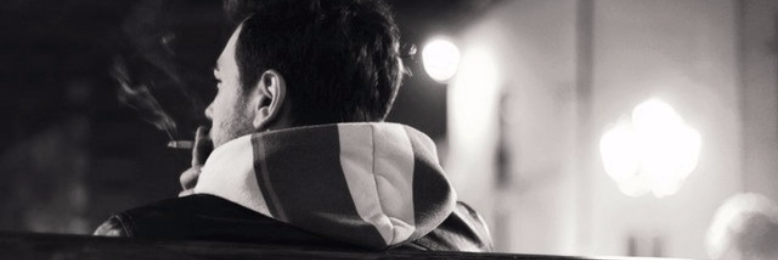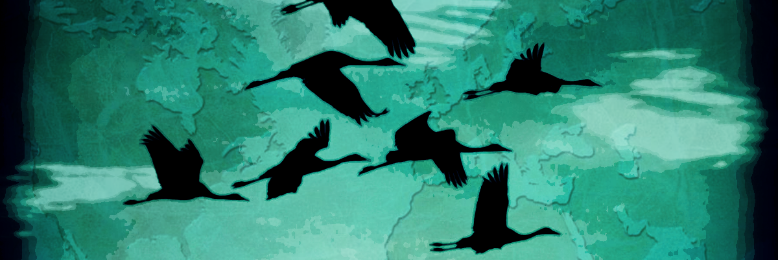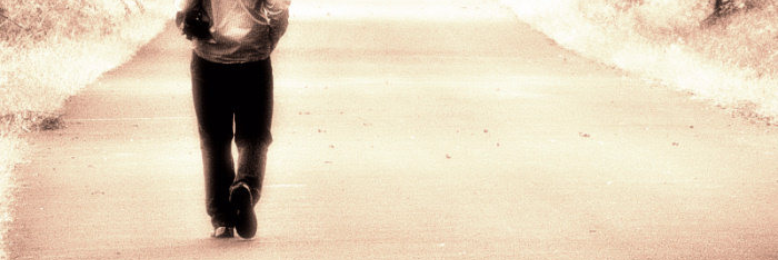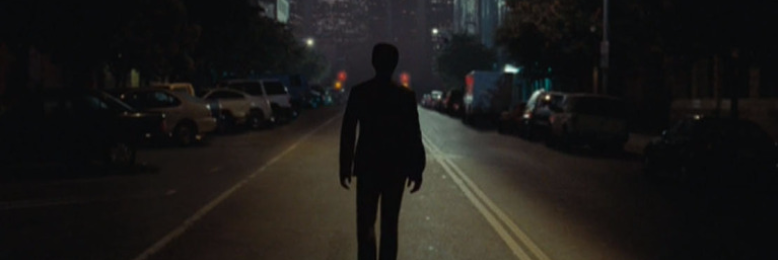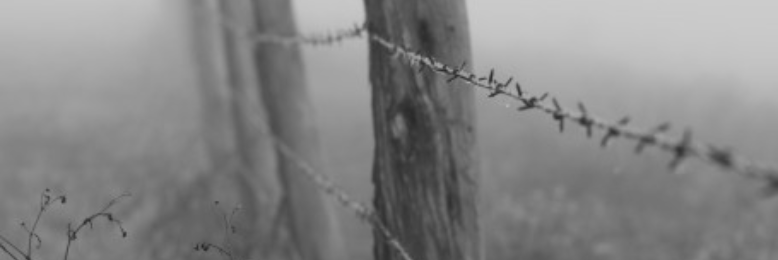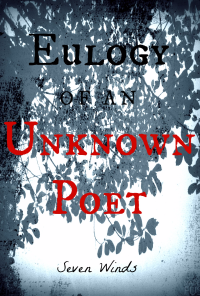
Strangers
He is a drifter most of the time, spending immortality wading through the endless towns and shifting faces that course within them. He is sad often, melancholy far more. Occasionally, he tries to settle down. He tries all of the things that promise happiness, but, for whatever reason, it never seems to work. Not long anyway.
Maybe he is searching for something he needs. Maybe he is running from something far away. Maybe he is running from something much closer. It never seems to make much of a difference. The outcome is always the same.
They don't seem to like him much, though the reasons seem to shift often, if indeed there was ever any at all. They are all so similar, it becomes difficult to pick them apart. He has been everywhere it seems, but he doesn't talk about it much. He, truth be told, doesn't talk about much of anything. He is so tired, and he can't seem to find a point anymore.
He exists somewhere between reality and truth, shuffling through the dimly lit streets of conscious, wallowing among the grimy recesses of emotion. Sometimes he has a name, but most of the time he goes without. He is simply "He", anything else would be unnecessary. He is in many stories, much more than will ever be written. He is not eloquent. He is not inspiring. He is never poetic. He is simply "He", anything else would be unnecessary.
He is a friend to none, an enemy only to himself. He is not pleasant to write about. He is not a hero, unsung or otherwise. He is not a champion to any cause, and noble only in ignorance. Nor is he a villain. He does not hate. He does not hurt. He breaks only himself. He is proven simply by his own hardship, and vindicated only be his own existence.
He is a drifter. He is an outcast. He is honest. He is human. He is real in a way that no other can be. And, for better or worse, he is simply "He". He need not be anything else. Anything else would be unnecessary.
Portrait of an American Arsonist
Man at bus stop
Uncombed hair
Loose-fitting jacket
Longing eyes
Nervous tick
Tortured mind
Long sleeves
Cheap lighter
Hidden scars
Alcohol and anger
Cigarettes and benzene
Two weeks notice
Empty apartment
Empty wallet
Passing busses
Passing faces
A single incident
A misunderstanding
A hard day
A fire lit in a workroom stall
A concerned report
A single report...
Bum
Loser
Freak
Scapegoat
Monster
Another bottle shattered
Another cigarette lit
A suitcase filled by morning
Yet somehow still empty
Another town
Another place
Another try
A man returning to a bus stop
One way ticket to nowhere
Long sleeves
Cheap lighter
Hidden scars
Alcohol and anger
Cigarettes and benzene
SevenWinds
The world has been spread before you,
Seven Seas
Seven Continents
And each of eight directions
You are free to choose any of them
Or, at least
All but one...
For one direction,
Means turning back
And a child of the road
Can never belong
Where they have already been
They belong only to the spaces
Only they will see..
So just keep walking drifter,
Let the air fill your ragged wings
For the winds will never fail you
When you have nowhere else to be
And out there under the distant skies
There are so many forgotten places
That you were meant to see...
The Wandering Man
He was older
Wild hair bleached white with age
The face of a sage
With restless eyes and worn out shoes
His overcoat stretched down to his ankles
Patched over yet always frayed
Emblazoned with the foreign dirt of distant lands
A thousand stories tucked in it's seams
He was too poor to eat
And too proud to beg
Too old to work
And to young to die
He carried nothing but his years
And his stories
Spending his entire life
Making just enough to survive tomorrow
He would sit at the counter in the Drug Store
Watching the world slowly shuffle by
Offering up a piece of his soul
For twenty five cents a shard
He would tell of the distant lands
That lie beyond the drug stores and cheap motels
He would tell of the people too
The kind that dressed funny and didn't smell like tobacco
Sometimes the stories were light and funny
Sometimes dark and heavy
But he would never tell you which
So you couldn't pick out all the funny ones
And you could watch him as he painted
Splattering the air with a thousand carefully chosen words
Dotting all of the stars with a wink
And raising mountains with a cleared throat
And for a quarter and a smile
He would tell you as many as you could hold
Before they started dancing in your head
And you could see them too
Then when night started to fall
He would sit up straight in his chair
And tell of the ghosts that hid in the mirrors
And the creatures that lurked in every shadow
And on those nights we walked home together
Doing our best to hide our fears
Swear never to go back there
Then scrounge up tomorrow's quarter
Day in and day out
Searching back alleys for lost change
Watching as the days passed by
From behind the drug store window
And then one day
He was gone
Just as he had came
Dusty boot prints on an open road
And somewhere out there was another drug store
And another group of wayward kids
Crowding around his feet
Quarters in hand
And maybe then
He would sit back
A brand new hole in his jacket
And he would tell them a story
He would tell them of the far away people
Who smelled like cigarettes and lived in cheap motels
And of the little kid with the wandering stare
Who sat alone and stared at a desolate road
And promised never to forget him.
The Jade House
Not much could be said for the house itself. It was a small, run-down shack with with a large, dilapidated roof and barred windows. Covering the walls was a large coating of tar, to keep at bay the frigid winter air that would seep in come December. It was situated in a large New England forest, isolated from the rest of the world, left to wither away into nonexistence. There was nothing charming about the dwelling, or anything wholesome. It was a sad little house, surrounded by a circle of diseased and dying trees, and stranded in a perpetual gloom. Something about it felt wrong, as if such a place should not exist, and being around it seemed to somehow weigh on one's mind. Even the squatters chose to stay away from it, giving a wide berth to the miserable little house. As far as anyone was concerned, nothing good came from that house, and it was left alone, free to rot in depressed silence.
This was, all but one man. He was a drifter, always a few dollars short of a meal, and a few miles from where he wanted to be. He had no house of his own, and had received word of the place from an old drunk, all in hopes of attaining another beer. The drifter did not particularly want to stay in the house; from what he had heard, it was not the kind of place one wanted to fall asleep in. But he needed a place to stay, had no money to buy a room, and held little esteem for superstition. A house was a house, and he needed somewhere to stay. And so, the drifter swallowed the last of his bummed drink, collected what little he owned, and headed for the little house.
He found it without any trouble. In fact, he was not entirely sure how he found it, considering he had never actually been told where it was. He had simply started walking, and it seemed to find him. It was, in appearances, much as it had been described. A small little shack, surrounded by a circle of dying grass and sickly trees, with an unnatural silence hanging about the place. The house itself was not too bad, he supposed. He had stayed in worse. Still, something about the place set him on edge. He told himself he was only staying for a night, just until he could move on in the morning. He stepped up onto the front porch, and slid the bag off of his shoulder. And after a deep breath, he pushed open the creaking door, and stepped inside.
Inside, the walls were bare, with long gashes on the walls and floors. All of the furniture had been shred by something, some kind of large animal by the looks of it, and strewn across the floor, collected haphazardly in large piles. From the rafters, long strands of cobwebs hung down, swaying silently with the breeze that blew in from the cracks in the walls. And In the center of the room, amid a small pile of shredded cloth, lay a large form, half buried in a pile of shredded cloth, but very much alive. The creature opened it's eyes and stared at him, with two large, jade colored eyes.
It looked like a wolf of some kind, but had a mix of dog blood within it's veins. It was black, with long, coarse hair, that had somehow stayed unmatted. It had sharp, hooked claws, which looked longer than any the man had seen. Even stationary, the creature still managed to look graceful, it's long hair seeming to ripple with each breath, difficult for a thing so large. It looked up at him, it's jade eyes searching him with almost unnatural intelligence. Still, it did not move, or attempt to rise from it's spot.
The creature made no move to get up, and stared at him patiently, the light dancing in it's bright green eyes. He knew he was not supposed to make eye contact, but there was something in those eyes that seemed to be drawing him, calling to him in a way that was not completely natural. He started walking before he realized what he was doing. He kept staring at those eyes, at the light that swirled just under their surface. And he watched as the strange green fire danced in those large irises, as he drew closer and closer.
He was not thinking any longer, he was obeying some long dormant instinct. He drew closer out of the singular need to do so. He could not stop his feet from walking, and, try as he might, he could not look away. Slowly, he raised his hand before him, as if offering it to the creature. He wanted to touch it, to feel it's soft head. He wanted to run his fingers through it's mane, and stare at those eyes, to watch the lights dance within them. Gradually, the house faded into the distance. It did not matter anymore. He reached the thing, close enough to touch now, and fell to his knees. He was so close now, and he could feel it's hot breath on his face. Still, he could not look away from those deep set eyes.
And, slowly, the creature raised it's head, and looked into his face. And it drew closer, still staring into his eyes, it's gaze piercing ever deeper. And, without a sound, it leaped toward him, forcing him violently onto the floor. And with one swift motion, it bit into his neck, and tore the life from his veins, splashing it onto the bare floor. The man saw none of this, however, he saw only the jade, even as it pulled him apart. And with one long, savage wail, the creature called into the night. And from the murky darkness a thousand creatures shuffled silently out of the diseased woods, an insane hunger burning in their jaded eyes.
Perfect Strangers
You do remember me, don't you?
I am the kid you never met in High School.
I am that friend you had in Middle School, whose name you can't seem to remember.
I am the greasy spoon waiter you stiffed when you forgot your wallet.
I am the bum that is always begging for bus money, even if he has nowhere else to go.
I am the hero you idolized when you were little, and the one you pretended not to when you got older.
I am the flashing face of every charity you have ever pitied.
I am the figure you were too scared to walk by at night, and the one you avoided in the day.
I am the one you smiled at when we bumped into each other in the grocery store, the one that helped you pick up what you had dropped.
I am the man in the bleachers with a beer-stained jersey, cheering a little too loudly for a team he has never actually met.
I am the kid in the back row who never said a word, the one who kept looking back at the floor every time you noticed him.
I am the hitchhiker you were always told not to pick up, or the one you were always too busy to help.
I am the driver of every passing car.
I am a blurred image in an endless crowd.
I am every face you have forgotten.
I am every presence you never noticed.
I am every story you have never heard.
So
You do remember me now,
Don't you?
A Finding
Within the Third Quarter, word of mouth travels at a speed that most never having been would most likely find impossible. The usual stuff of gossip mainly involved various crimes, scandals, and exactly which individuals were known to have been in, or currently partaking in an affair. While many of the residents within the poverty stricken district found this an enjoyable form of entertainment, such conversations always had a certain predictability that made it a rather mundane aspect for a great many of the population. Given this, it was only a matter of time before the fear-crazed ramblings of the two gravediggers found their way into the local circuit. This offered a new excitement to a great many, and most residents of the Third Quarter where familiar with the story by the following day. What could not have been predicted at the time, however, was how the story continued to spread. It ate through the city, spreading like wildfire through the crowded streets. Within days, even the most affluent neighborhoods knew of the incident, and public intrigue began to hit a climax.
This was why, at the urgent request of the mayor, the local police force launched an official investigation into the matter. Though they did so primarily to appease the general public, it is to their credit that they conducted a thorough investigation nonetheless. First, they attempted to question the two gravediggers from which the story had originated. Despite their most valiant efforts, however, they could find no trace of either of the men. Perhaps it was due to their humble and independent lifestyles, or the men may have simply shared the same general distrust for law enforcement so prevalent within the Third Quarter. Whatever the reason, the police was unable to locate either man, and no information as to their whereabouts was offered. It was as if they had simply vanished.
Despite this, however, information was offered as to the whereabouts of where the deceased Arthur Blackwell was to be lain to rest, though the source of this information remained unknown to all but the individual responsible. The individual told police, via a small scrawled note under a doorway, that they had seen the two gravediggers fleeing from a small graveyard a good ways away from the crowded city, known as Jenkins Corner. With this key information, a small group of officers were dispatched to investigate the area, and find what had become of the late Arthur Blackwell. What they found did very little to calm the public.
"Would ya' spit it out?" Growled the city police commissioner, cigar in hand. "Did you find him or not?" He demanded angrily, cigar smoke spilling through his clenched teeth and clouding around his pockmarked face. He wore a thick black overcoat over his large frame, with a hastily knotted tie, which he had a habit of readjusting when he spoke. With his free hand, he tapped his steel lighter against his desk, in a rapid, angry motion. He had a serious face, marked with worry lines, and a stare that seemed to bore through any unfortunate enough to earn it.
Before him stood two police officers, dressed in their formal attire. They had taken the hats off of their heads, and were wringing them anxiously. Both were understandably nervous, each finding various discrete ways to wipe away the sweat pooling on their foreheads, as it streaked down their faces, and into their pressed white collars. The one on the right spoke first.
"We found- something, sir." He stammered, the second nodding in over pronounced exaggeration. "It's just not really the kind of thing we were expecting." He said, nervous fear making his voice rise and fall at odd intervals. He opened his mouth to say something else, but met the unwavering gaze of the commissioner, and lost the ability to speak, his mouth moving silently up and down, before pressing tightly together. The second filled in. "We found the grave, sir. And the casket too. It's just-" Her voice trailed off as well.
"What?" The commissioner's voice had now turned from a fierce bark to a low snarl, making it painfully clear his temper was failing him. The first officer spoke up again, apparently finding his voice. "It's empty. Sir. The casket was empty." At this, the commissioner lounged back in his chair, his temper cooling as his interest mounted. He took the cigar out of his mouth and held it before him, rotating it in his hand, as if noticing it for the first time. He did this whenever he deemed a thought more important than his smoking habit, which was exceedingly rare. "So someone opened it." He said, still staring intently his cigar.
At this the second officer chimed in, her apprehension slowly dissolving. "There's something else. We found scratches, all along the lid, on the inside. We thought they were nothing at first, but we looked at them a little closer, and they started to look like..." She faltered then, and paused to draw breath. The commissioner said nothing, still tapping his lighter against the desk, looking at her expectantly. Nothing in the room moved, and it seemed even the commissioner's cigar smoke had stopped rising, and it became evident that she was shaking. She coughed into her hat, and looked up again, but could not meet the commissioner's eyes. She glanced at her partner, who nodded in return, fear evident on his face. She turned back to tile floor, staring at it as if it might swallow her whole, all while still wringing her hat.
"Writing, sir." She said, without looking up from the floor. She took another moment to breath, but still could not lift her gaze from the cold tiles below her. Her partner remained still, his mouth half open, frozen in mid sentence.
"And it matches Blackwell's."
An Unfortunate Incident
It was a bleak December day, with a dark rain drizzling softly on the freshly turned dirt, and quietly soaking into the dying grass below. The sky overhead was filled with a sea of dark and foreboding clouds, and in the distance, the faint sound of approaching thunder could be heard as it crackled weakly against the empty sky. Even the flowers that lie atop the headstones were of a saddened hue, as if to accommodate the darkened and monochromatic dimness of the day. It was one of those long, dreary days that most are prone to forgetting, and which seem to exist only to provide contrast to the days immediately following. In short, there was nothing to distinguish this day from any other, and it was all too easy to overlook the unfilled grave of Arthur Blackwell.
Blackwell himself had lived a recluse for much of his life, and it was very seldom that he ever ventured out of his one room apartment, on any given occasion. Blackwell was not very well known by any of the residents of his apartment building, this including the landlady. He spent very little time with anyone aside from himself, instead preferring to stay within his room, though, truth be told, no one really knew if he truly preferred living in such a manner at all. He was not a dislikable man by any means, but not overly charismatic either. He lived very poorly, but always managed to pay his rent on time, and without complaint. When residents passed him in the hallway, he always made an effort to be friendly and hospitable, even though he often found these efforts difficult. He was a sickly man, and presumably had been all of his life. Perhaps it was this sickness, or maybe even his isolation that had began his lifelong trend of writing. Arthur, though none knew it at the time, was a poet.
Blackwell represented one of the more grim sides of authorship, that few outside the profession are apt to consider. He was, undeniably, very good. In fact, he may have been among the best, as far as his writing was concerned. He primarily crafted darker works, containing moving depictions of hidden emotion and unseen worlds, and had he not been born at such a late period of time, his works might have rivaled even the coveted Poe. Despite this, however, he was very little known, with only a meager amount of works in circulation. He had attempted to publish some of his works, but, unfortunately, few saw the merits of such an art among the developing world, and employment was scarce. Even when he did publish any type of writing, it was often a work that he deemed lesser than his full capacity, as he was extremely sensitive, and lived in fear of having one of his masterworks rebuked. So, with the stagnant market for fine word craft, and his painfully demure personality, he was only able to find employment as a storekeeper's assistant, and even this was only for so long as he was able keep up the facade of good health, and he knew it to be only a matter of time before this too would be lost.
And so it was, with rapidly deteriorating health, poor living conditions, and a tragically suppressed soul, Blackwell passed away in his room one late evening. He was found a few days later, wrapped in a frayed blanket, in a vain attempt to keep at bay the winter cold. Whether he was in his late twenties or early thirties no one was quite sure, as none were able to locate any of his birth records. He was to be buried in a local cemetery the following day, as none saw the point of postponing it any longer, as he had no friends to speak of, and no remaining relatives. So, the following evening, under the bleak mid morning haze, two men armed with heavy raincoats and dull spades said a quick prayer for the dead poet, and dug what was to be the young author's final resting place, among the withered flowers of a pauper's graveyard.
The men worked diligently, with a somber air that matched their grim task, shovels of dirt and mud steadily being cast from the small pit. The first was an immigrant of British decent, and, like most new immigrants in the city, was too poor to mend the underarm holes on his tattered coat, which had been worn away from years of shoveling. He drove his shovel into the dirt, and took a moment to lean against it, wiping the sweat from his face. "Poor bloke, 'ate ta see 'em go 'ike 'is, no fam'ly n' all." He said solemnly, shaking his head back and forth slowly. "Ut un' ev'n get a preacher." He stood and mused for a while, before adding "All o' em' at least dese've a preacher."
At this, the man picked up his shovel, and resumed his work. The second remained silent, though he paused to consider the previous man's statement for a moment, before sinking his shovel into the hard packed earth. He was a more reserved man, with deep set eyes and a tall, thin frame. Despite being born within the city, he was scarcely better off than his counterpart, and had grown up within the impoverished Third Quarter. He had a habit of thinking over a conversation thoroughly before responding, choosing to do so with as little words as possible. This thought, however, he would never finish.
"Hear that?" The man said suddenly, laying down his spade. The Briton did not have time to respond, as the man had already begun pulling himself out of the hole. "'Ut 'cha you doin', Charles?" The Migrant asked, letting his spade drop from his hands. Charles did not answer, but stood silently before the unopened casket of the man he was to bury. He stood, rain dripping off of his wide-brimmed hat and running across his back, listing intently to some indistinguishable sound. Slowly, his head turned toward the casket, wearing an expression of rapt disbelief.
The second dug his hands into the saturated earth, and pulled himself out of the grave, standing alongside his silent companion. Once again he questioned Charles, concern rising in his voice. He tried to slow his speech, wondering if he had been misheard, pronouncing each word with added emphasis. "What is it Charlie?" Charles still did not answer, staring in disbelief at the casket, before slowly pointing a shaky finger at the rough pine box. Then, both men fell silent, and just audible over the sound of the drizzling rain, there was a faint scratching sound, as something slowly scraped away the wood within the casket.
Had the men not been so shook by this, they might have reasoned that a small animal might have managed to crawl inside the casket. They might have even pried back the lid of the casket, to see what lie within for themselves. Perhaps it had been the weather that had drove them to it. Maybe, in their occupation, it had simply been inevitable. Whatever the reason, each man left their spades where they lie, and fled the graveyard, without stopping to so much as glance behind them, even to see what had become of the other; for each man knew fully well that the casket held much more than the lifeless body of the late Arthur Blackwell, and whatever was in that casket, did not want to be buried.
The Drifter
He had walked for miles, the dry dust of the desolate road stinging his eyes and clouding his vision, caking hardened earth on the inside of his labored lungs. The sun over head was a bright, angry red, and poured out an angry onslaught of blistering heat on his sun scorched face. He walked in a kind of lurching motion, weariness, hunger, and thirst clenching in his stomach and slowing his weathered mind.
He had nothing, save a large, tattered overcoat, which wrapped around his ankles when he walked. Everything else he had left along the roadway, in order to save himself the weight of carrying it. Not that he had much else, save a few pots and pans and a plastic water bottle. All useless with no food to prepare, and no water to drink.
He was walking along a dusty back road, and had seen no one else on it. It was most likely abandoned, and the odds of him seeing anyone were scarce. He had not eaten for days, and the cramps in his stomach made it hard to walk. This was nothing, however, compared to his thirst. He could not remember the last time he had drank anything, and he had to frequently stop to cough up thick masses of dirt, often followed by bouts of dry heaving. His head throbbed with a aching, feverish pain, which radiated through his skull, and left small black dots on his blurry vision.
He knew the odds of being found were little, but that had not stopped him from constantly looking ahead at the abandoned dirt road before him, as if a rapture might appear at any moment, spewing cold water from the burning dust. Whether it was these thoughts that kept him going, or the inability to think beyond them was uncertain, even to him. He walked simply because he had to walk. Around each bend in the road lie another chance of salvation, and his life now depended solely on finding it. So, with a lurching step, and head downcast, he pressed on.
He was unsure of how long he walked like this, minutes and hours had long since melded into obscurity. He knew only when he stopped, when the pebbles along the roadside began to jump. He knew, better than any, what that meant. A car was coming. Salvation had finally arrived.
The car pulled up, a teal sedan with three passengers. The radio played loudly out of the lowered windows, overlaid with three high pitched voices, singing and laughing. He waved his hands frantically, and he could see the driver look in his direction. He shuffled his way to the car, hands still waving.
Without a word, the windows in the car rolled up, and the car sped past him, without a backward glance. He fell to the ground, choking violently on the dust the car left behind. And with one last pleading glance, he watched as salvation vanished, swallowed by the quickly fading horizon.

